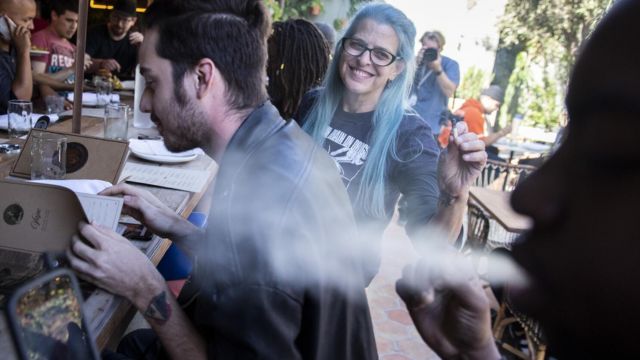Despite concerns about the health risks of secondhand smoke, Governor Gavin Newsom signed legislation on Monday allowing cannabis dispensaries to sell hot meals and nonalcoholic beverages.
Assembly Bill 1775, which goes into effect on January 1, provides California governments the option of allowing dispensaries to cook and serve hot meals and nonalcoholic beverages on-site, as well as organize live acts like concerts and comedy shows.
Customers can already smoke, vape, and try edibles at select Golden State dispensaries, but they are only permitted to sell prepared snacks and drinks.
Supporters argue that a more welcoming recreational marijuana culture will revitalize California’s nightlife and increase earnings for the state’s heavily taxed, heavily controlled legal cannabis dispensaries, which compete with black-market vendors.
“Cannabis cafes are going to be a huge part of the future of cannabis in our state and will help to beat back the illegal drug market,” said Assemblymember Matt Haney (D-San Francisco), the bill’s author.
The “cannabis cafe” approach has been compared to Amsterdam, where cannabis usage is legal in coffee shops since the 1970s.
The law received backing from the United Food and Commercial Workers union, which represents workers at dozens of dispensaries and grow facilities in California.
Last year, Newsom rejected a similar bill, citing fears that secondhand smoke could endanger food workers and customers.
The American Cancer Society and other public health organizations urged Newsom to veto this year’s bill, claiming that secondhand marijuana smoke contains more particulate matter than tobacco smoke and can cause cardiovascular illness, lung irritation, and asthma attacks.
According to Jim Knox, California managing director for the American Cancer Society Cancer Action Network, the new rule will undercut the state’s decades-long campaign to create smoke-free workplaces and may impede the cultural shift away from indoor smoking.
When the law goes into effect, Knox states that Californians will be able to “smoke in a restaurant for the first time in 30 years.” That’s a huge step backward.”
He stated that the organization will continue to encourage local governments to “resist efforts that would undermine our history of smoke-free restaurants and roll back critical public health protections.”
The bill signed into law on Monday states that if cities choose to impose ventilation standards as a condition for a permit, the systems must be powerful enough to prevent “smoke and odors from migrating to any other part of the building hosting the consumption lounge or any neighboring building or grounds.”
The bill also emphasizes that cannabis cafe employees have the right to wear respirator masks paid for by their employers. Employers would also have to include secondhand smoke in the injury and disease prevention programs required under California labor law.
These steps, according to Knox, are “nonsense” and “window dressing” that “just underscore that there’s a public health risk.”
“There is very well-established science and industry knowledge that you cannot isolate smoke — it can’t be done,” Knox told reporters. “The only way to prevent migration of smoke is to not allow smoking.”
In his signing message, Newsom stated that any future laws that depart from the bill’s “tailored approach” to worker safeguards against secondhand smoke “will not be looked upon favorably.”
Newsom said that it will be “critical” for local governments to prioritize workplace safety while also working to reduce public safety hazards. If they do not, he stated, “it may be necessary to reconsider this limited expansion.”















+ There are no comments
Add yours